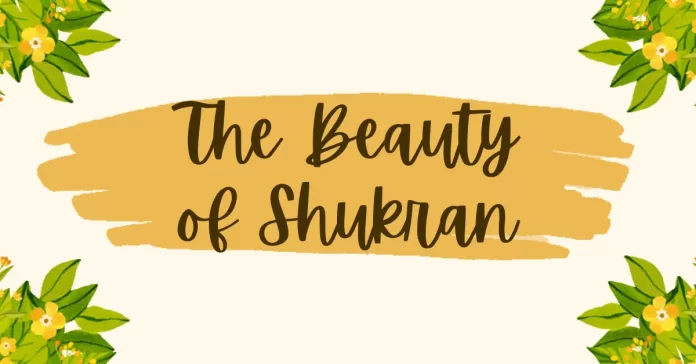Introduction to Shukran
In the Arabic language, the word “Shukran” (شكراً) translates to “thank you.” It is a simple yet powerful expression used to show appreciation and gratitude towards someone for a kind act or favor. The concept of gratitude in Islam extends beyond mere words and is deeply rooted in the teachings of the Quran and Hadith, where expressing thanks to others is considered a form of worship.
The Meaning and Significance
The word “Shukran” is derived from the root word “sh-k-r” (شكر), which means to acknowledge or to be thankful. In the context of Islamic teachings, expressing gratitude is not just about recognizing the good done by others but also about acknowledging the blessings bestowed by Allah (SWT). Gratitude, or “Shukr,” is one of the key virtues in Islam, emphasizing the importance of being thankful to both the Creator and His creation.
In Arabic Text
“Shukran” is written in Arabic as:
شكراً
This word can be modified slightly depending on the context or the degree of appreciation. For example:
- Shukran Ya Lak (شكرا يا لك): Thanks a lot.
- Shukran Jazilan (شكرا جزيلا): Thank you so much.
- Shukran Jazilaan Lak (شكرا جزيلا لك): Thank you very much.
In the Quran and Hadith
The importance of gratitude is highlighted in various verses of the Quran and Hadith. While the specific word “Shukran” may not be directly mentioned, the concept of being grateful is deeply emphasized.
Quranic References
- Surah Ibrahim (14:7): “And [remember] when your Lord proclaimed: ‘If you give thanks [by accepting faith and worship], I will give you more [of My Blessings]; but if you are thankless [i.e., disbelievers], verily My punishment is indeed severe.'” This verse highlights the significance of gratitude towards Allah and how it leads to increased blessings.
- Surah Al-Baqarah (2:152): “So remember Me; I will remember you. And be grateful to Me and do not deny Me.” Here, Allah commands believers to remember Him and express gratitude, which is a way of acknowledging His presence and favors.
Hadith References
- Sahih Bukhari (Volume 8, Book 73, Number 8): The Prophet Muhammad (PBUH) said, “He who does not thank people is not thankful to Allah.” This Hadith emphasizes that thanking others is an integral part of being grateful to Allah, as every good act is ultimately a blessing from Him.
- Sahih Muslim (Book 42, Hadith 7105): The Prophet Muhammad (PBUH) said, “Allah is pleased with His servant who says: Al-Hamdu Lillah (All praise is due to Allah) when he takes a morsel of food and drinks a draught of water.” This Hadith illustrates how expressing gratitude in everyday actions is pleasing to Allah.
The Etiquette of Saying Shukran
In Islamic culture, saying it is more than just a polite response; it is a reflection of one’s character and acknowledgment of the blessings from Allah. It is a sunnah to express gratitude, not just verbally but also through actions. When someone does you a favor, responding with it is a way of acknowledging their kindness and the will of Allah that allowed it to happen.
Replying to Shukran
The appropriate response to it is “Afwan” (عفواً), which can mean “you’re welcome” or “not at all,” depending on the context. This exchange fosters mutual respect and recognition of each other’s contributions.
Variations of Shukran
Depending on the intensity of the gratitude, variations of it can be used:
- Shukran Ya Lak (شكرا يا لك): This is a more personal way of expressing thanks, often used when addressing someone directly.
- Shukran Jazilan (شكرا جزيلا): This phrase adds emphasis, indicating a deeper level of gratitude.
- Shukran Jazilaan Lak (شكرا جزيلا لك): This variation is more formal and expresses profound appreciation.
Shukran in Everyday Life
Gratitude in Islam is not limited to special occasions; it is a daily practice. Muslims are encouraged to say it in various situations to cultivate a habit of gratitude. Below are some examples of how it can be used in everyday life:
- Shukran for Helping Me Move In: A simple thank you for someone who has helped with a task.
- Shukran for the Well Wishes and Prayers: Expressing gratitude for the good thoughts and prayers of others.
- Shukran Ya Allah for Another Blessed Friday: Thanking Allah for the opportunity to witness another Friday, a day of significance in Islam.
- Shukran for the Blessing of a Child: Expressing gratitude to Allah for the blessing of a new life.
- Shukran Allah for Success in a Course: Acknowledging Allah’s help in achieving success.
The Spiritual Dimensions of Shukran
Gratitude in Islam goes beyond verbal expression. It is deeply connected to one’s faith and spirituality. When a Muslim says it they are not only thanking the person but also recognizing Allah’s role in making the good deed possible. This acknowledgment fosters a sense of humility and strengthens the bond between the believer and the Creator.
The Role of it in Building Community
In a broader sense, the frequent use of shukran within a community helps build strong, positive relationships. It encourages a culture of appreciation and respect, where people feel valued and recognized for their efforts. This, in turn, fosters a sense of unity and cooperation, essential elements for a thriving community.
Conclusion: Embracing the Virtue of Shukran
The word “Shukran” may seem simple, but it carries profound meaning in Islam. It is a reminder to be grateful in all aspects of life, recognizing the blessings of Allah and the kindness of others. By integrating into daily conversations, Muslims can cultivate a habit of gratitude that enriches both their spiritual and social lives.
Embrace the virtue of and let it be a reflection of your gratitude towards Allah and His creation. Whether you are thanking a friend, a family member, or even Allah Himself, remember that every act of gratitude brings you closer to the Divine and strengthens the bonds within your community.

